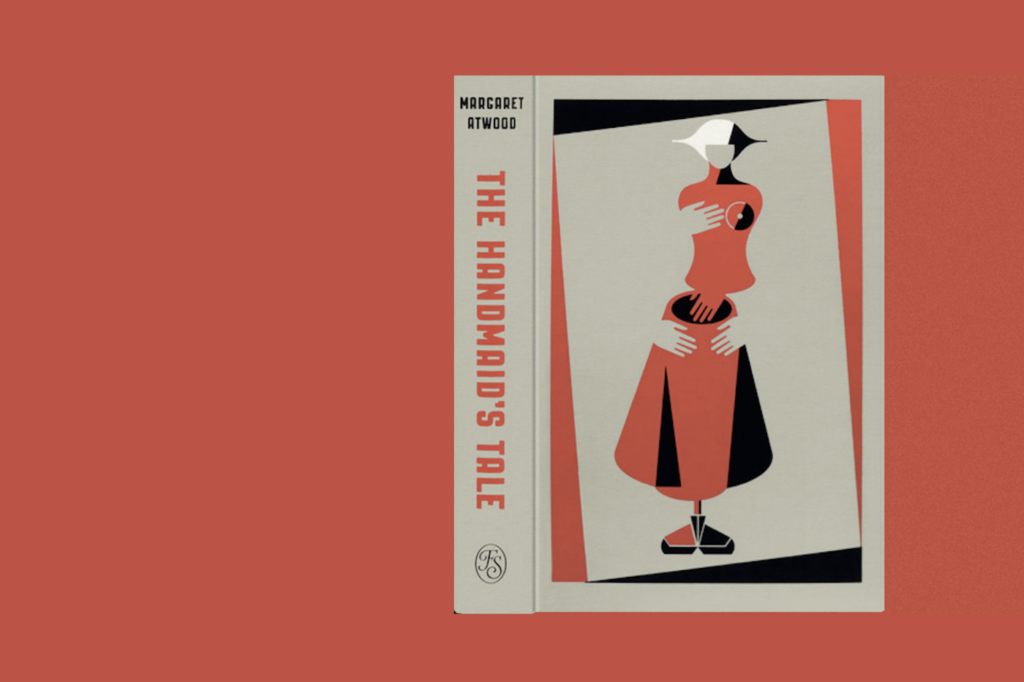“‘I’ll take care of it.’ . . . And because he said it instead of her, I knew he meant kill. That is what you have to do before you kill. . . . You have to create an it, where none was before.”
This stark passage comes from the pages of Margaret Atwood’s dystopian novel, The Handmaid’s Tale, when the protagonist’s husband offers to “take care of” the family cat before the couple attempts to escape the clutches of the rising Republic of Gilead, the quasi-religious, totalitarian regime that serves as the novel’s antagonist.
The regime comes to power in a society that was previously wracked by sexual anarchy and plagued with infertility. When the Senate and the President are assassinated, religious fanatics seize power and establish Gilead. The new government forces women out of the workplace, offers fertile “handmaids” as surrogates to infertile, well-to-do couples, and institutes the practice of “forced birth.” The book’s plot centers on one such handmaid, Offred, who, under the previous government, had held her own job, controlled her own finances, and had a husband and young child whom she loved—all of which she loses under the new order.
An Indictment of Traditionalism, or Its Vindication?
Start your day with Public Discourse
Sign up and get our daily essays sent straight to your inbox.Not surprisingly, the novel has provided plenty of ammunition for pro-abortion or other progressive activists. In recent years, many women have taken to dressing in red handmaid’s outfits to protest conservative-leaning policies and political figures. Whether their focus be abortion or gender equality, they see a clear connection between themselves and the oppressed women of Atwood’s book. Perhaps for this reason, the book—originally published in 1985—is enjoying renewed popularity. Hulu has even created its own The Handmaid’s Tale series drama, the third season of which was released June 5th.
The comparison between contemporary America and Gilead might seem straightforward: the book’s protagonists are progressive America, and the totalitarian regime is the Trump presidency. Many naturally interpret the story as a struggle of freedom versus oppression, good versus evil, enlightenment versus religious fundamentalism.
However, the real message is far more subtle and sobering. What the (often heavy-handed) Hulu adaptation and its modern viewers miss is that The Handmaid’s Tale isn’t simply about white bonnets and pithy slogans. The Handmaid’s Tale is about the consequences of rewriting the morality of a whole culture. Gilead’s views of human life and sexuality find parallels not in traditional conservative policies―which value both freedom and life―but in radical progressivism, which, by destroying mediating institutions, destroys personal responsibility. The book is a warning that cheapening human life might come with a steep price tag.
The world of The Handmaid’s Tale prior to the rise of Gilead is not unlike our world today. Women were equal to men under the law: they held property, controlled their own finances, and worked outside the home. At the same time, pornography, birth control, abortion, and infidelity were commonplace, sometimes even celebrated. There was freedom, but perhaps also a sense that something wasn’t quite right.
Gilead arises in reaction to this dying culture, which Atwood describes starkly in a secret conversation between Offred and the man―“Commander”―whom she serves:
“The problem wasn’t only with the women,” he says. “The main problem was with the men. There was nothing for them anymore. . . There was nothing for them to do . . . I mean there was nothing for them to do with women.”
“What do you mean?” I say. “What about all the Pornycorners, it was all over the place, they even had it motorized.”
“I’m not talking about sex,” he says. “That was part of it, the sex was too easy. Anyone could just buy it. There was nothing to work for, nothing to fight for. We have the stats from that time. You know what they were complaining about the most? Inability to feel. Men were turning off on sex, even. They were turning off on marriage.”
Gilead is a cure worse than the problem it treats (like many responses to cultural decline in real history). The government strips women of their personal finances and their right to work. The handmaids are kept locked away at home and relentlessly abused, mentally and sexually. Strip clubs and pornography are maintained secretly on the black market for the enjoyment of the ruling class. The government sanctions infidelity to increase fertility, and infanticide to eliminate disabled babies.
Two Societies, One Problem: The Tyranny of Selfishness
Gilead is a morally abhorrent regime, but the preceding oversexualized culture was not good either. And yet on some level, Gilead’s morality is not that different from that of the culture it replaced. Gilead’s problems come not only from what it changes but from what it keeps.
Even Offred, the heroine, expresses unease with her own moral attitude before the rise of Gilead. She admits to the reader that she had an affair with a married man named Luke, whom she later married and with whom she had a child. Her friend Moira “disapproved . . . of the fact that he was married,” saying that she was “poaching, on another woman’s ground.” Offred reflects, “She said I was rationalizing. I said I was in love.” Once she becomes a handmaid, however, Offred confronts infidelity in a much harsher way: she is placed between a husband and wife as a forced concubine. This act violates not only Offred’s sexuality, but also the marital bond between the husband and wife.
Despite these experiences, Offred’s view of marital fidelity remains quite casual: “Luke was not the first man for me, and he might not have been the last.” Offred is uncertain whether Luke and their child survived after the rise of Gilead, but she often thinks of them. Nevertheless, in her despair she starts a secret affair with a man named Nick, warning the readers that she is about to disappoint them. She says, “I did not do it for him, but for myself entirely.”
Doing things “for myself entirely” is the common thread between Gilead and the preexisting society. In Gilead, those in power commit infidelity and sexual abuse for self-gain. Babies, marriage, and sex are commodities to be pursued―or not. Gilead prohibits abortion (as real-life protestors emphasize) not because abortion takes innocent lives, but because it prevents births during a fertility crisis. However, disabled babies may be killed in Gilead. These babies that Gileadean society deems less desirable are simply an “it” to be “taken care of.” In the book Offred maintains her awareness of the dangers of human psychological descent and of the process of making a he or she into a distant it: “That’s one of the things they do. They force you to kill, within yourself.” The tragedy of Gilead and its precursor is the same: they do not recognize the innate, eternal value of human beings. They differ only in who decides who is or is not valuable. Similarly, in our world, many “empowered” women are deceived by abortionists into thinking that their babies—each one a unique expression of the union of his or her mother and father―are simply an “it” to be “taken care of.”
A major theme in The Handmaid’s Tale is the loss of autonomy. But equivocating about autonomy cannot disguise the fact that holding property or controlling one’s finances is not the same as aborting a baby. Conservative policies that affirm the value of the unborn baby in no way resemble the “policies” of Gilead. Healthy independence ought to be celebrated―but the dependence of a preborn baby on her mother also ought to be celebrated as a natural and beautiful part of life. The life-giving nature of a woman ought to be treasured, and the perverse and false victory of mother over child in abortion ought to be grieved.
The life-giving nature of a woman ought to be treasured, and the perverse and false victory of mother over child in abortion ought to be grieved.
A Dangerous Disconnect from Reality
The Handmaid’s Tale is at best a thought-provoking literary work, and at worst a straw-man argument against traditionalism and conservatism. Atwood fails to deliver an intelligent critique of conservative Christian values, and her book does not reach the caliber of George Orwell’s tales. Perhaps her forthcoming sequel to The Handmaid’s Tale will improve her argument.
In the meantime, the Hulu series seems to have fomented a dangerous and misplaced sense of injustice among some viewers, who see diminished abortion “rights” as synonymous with the relentless physical and sexual abuse that the handmaids suffer. The handmaids suffer forced conception and forced birth, while the majority of unplanned pregnancies in the United States, by an enormous margin, are not forced conception: conception is occurring in a voluntary manner. America may be on the cusp of reversing Roe v. Wade, but it is certainly not about to take away a woman’s right to work, to maintain her own finances, or to engage in a sexual relationship only by her consent. Yet today’s “feminists” appear to believe that all women’s rights are meaningless without unrestricted sex and unlimited access to abortion.
There can be no right to abortion; there can be no right of the strong over the weak. Any healthy, functioning society must recognize and uphold the innate value of every person. As the great political theorist and philosopher Edmund Burke said:
[Society] is not a partnership in things subservient only to the gross animal existence of a temporary and perishable nature. It is a partnership in all science; a partnership in all art; a partnership in every virtue, and in all perfection. As the ends of such a partnership cannot be obtained in many generations, it becomes a partnership not only between those who are living, but between those who are living, those who are dead, and those who are to be born. Each contract of each particular state is but a clause in the great primeval contract of eternal society.
We are linked, inseparably, with our past, present, and posterity. To devalue the human person and human sexuality is to destroy society. Abortion is an act of great violence against a fellow human person―and not only against the baby whose life it extinguishes, but against society as a whole. It must always be condemned. People of good will must defend the dignity of every human person, born and unborn, and uphold the sacred bond of marriage that allows society to flourish by the strength of the family. Perhaps Americans would do better to read more Edmund Burke and less Margaret Atwood.













